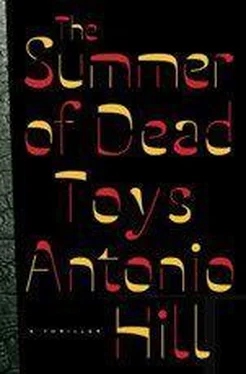Antonio Hill - The Summer of Dead Toys
Здесь есть возможность читать онлайн «Antonio Hill - The Summer of Dead Toys» весь текст электронной книги совершенно бесплатно (целиком полную версию без сокращений). В некоторых случаях можно слушать аудио, скачать через торрент в формате fb2 и присутствует краткое содержание. Жанр: Триллер, на английском языке. Описание произведения, (предисловие) а так же отзывы посетителей доступны на портале библиотеки ЛибКат.
- Название:The Summer of Dead Toys
- Автор:
- Жанр:
- Год:неизвестен
- ISBN:нет данных
- Рейтинг книги:4 / 5. Голосов: 1
-
Избранное:Добавить в избранное
- Отзывы:
-
Ваша оценка:
- 80
- 1
- 2
- 3
- 4
- 5
The Summer of Dead Toys: краткое содержание, описание и аннотация
Предлагаем к чтению аннотацию, описание, краткое содержание или предисловие (зависит от того, что написал сам автор книги «The Summer of Dead Toys»). Если вы не нашли необходимую информацию о книге — напишите в комментариях, мы постараемся отыскать её.
The Summer of Dead Toys — читать онлайн бесплатно полную книгу (весь текст) целиком
Ниже представлен текст книги, разбитый по страницам. Система сохранения места последней прочитанной страницы, позволяет с удобством читать онлайн бесплатно книгу «The Summer of Dead Toys», без необходимости каждый раз заново искать на чём Вы остановились. Поставьте закладку, и сможете в любой момент перейти на страницу, на которой закончили чтение.
Интервал:
Закладка:
“Well, Inspector, I’m glad you feel at your ease.” “Sorry, I suddenly remembered something. An anecdote about my son.” He regretted it instantly, sure that this wasn’t the most opportune moment to bring it up.
“Ah-ha. You don’t have much faith in psychology, right?”
There was no hostility in the phrase, but an honest curiosity.
“I haven’t formed an opinion of it.”
“But you mistrust it from the outset. Fine. Of course most people feel the same about the police, wouldn’t you say?”
Héctor had to admit that was true, but he qualified it.
“Things have changed a lot. The police aren’t seen as the enemy any more.”
“Exactly. They’ve stopped being the body that strikes fear into a citizen, at least an honest one. Although in this country it took time to change that image.”
In spite of the neutral, impartial tone, Héctor knew that they were sliding down a rocky slope.
“What do you mean by that?” he asked. He was no longer smiling.
“What do you think I mean?”
“Let’s get to the point. .” He couldn’t help a certain impatience, which usually translated into a lapse into his childhood accent. “We both know what I’m doing here and what you have to find out. Let’s not beat about the bush.”
Silence. Salgado knew the technique, although this time he found himself on the receiving end.
“Fine. Look, I shouldn’t have done it. If that’s what you want to hear, then there you have it.”
“Why shouldn’t you have done it?”
He tried to stay calm. This was the game: questions, answers. . He’d seen enough Woody Allen films to know that.
“Come on, you know. Because it’s not good, because the police don’t do that, because I should’ve stayed calm.”
The psychologist jotted down a note.
“What were you feeling at the time? Do you remember?”
“Rage, I suppose.”
“Is that a regular thing? Do you usually feel rage?”
“No. Not up to that point.”
“Do you remember any other moment in your life when you lost control in that way?”
“Maybe.” He paused. “When I was younger.”
“Younger.” Another note. “How long ago. . five years, ten, twenty, more than twenty?”
“Very young,” stressed Héctor. “Adolescent.”
“Did you get into fights?”
“What?”
“Did you usually get into fights? When you were a teenager.”
“No. Not as a regular thing.”
“But you lost control one time.”
“You said it. One time.”
“Which time?”
“I don’t remember,” he lied. “None in particular. I suppose I went through an out-of-control phase, like all boys.”
A new note. Another pause.
“When did you arrive in Spain?”
“Pardon?” For a moment he was on the verge of answering that he’d arrived a few days previously. “Ah, you mean the first time. Nineteen years ago.”
“Were you still in this out-of-control adolescent phase?”
Héctor smiled.
“Well, I suppose my father thought so.”
“Hmmm. It was your father’s decision, then?”
“More or less. He was Galician. . Spanish; he always wanted to return to his native country but couldn’t. So he sent me here.”
“And how did you feel?”
The inspector made a gesture of indifference, as if that wasn’t the pertinent question.
“Excuse me, but I can see you’re young. . My father decided I had to continue studying in Spain and that was it. No one asked me.” He cleared his throat a little. “Things were like that then.”
“You didn’t have any opinion on the matter? At the end of the day you were made to leave your family, your friends and your life there behind. Didn’t it matter to you?”
“Of course. But I never thought it would be permanent. Besides, I repeat: they didn’t ask me.”
“Ah-ha. Do you have siblings, Inspector?”
“Yes, one brother. Older than me.”
“And he didn’t come to Spain to study?”
“No.”
The silence following his answer was denser than before. There was a question working its way to the surface. Héctor crossed his legs and looked away. The “kid” seemed in doubt and, finally, decided to change the subject.
“In your file it says you separated from your wife less than a year ago. Was she the reason you stayed in Spain?”
“Among others.” He corrected himself. “Yes. I stayed here for Ruth. With Ruth. But. .” Héctor looked at him, surprised he didn’t know: these details would also be in the files. The feeling that his whole life, at least the most recent facts, could be in a dossier within reach of anyone who had the authority to examine it bothered him. “Sorry.” He uncrossed his legs and leaned forward. “I don’t want to be rude, but can you tell me where this is going? Look, I’m perfectly aware that I made a mistake and that it could-can-cost me my job. If it means anything, I don’t think I did a good thing, and I’m not proud of it, but. . But I’m not going to discuss all the details of my private life, nor do I believe you have a right to meddle in it.”
The other man listened to his speech without turning a hair and took his time before adding anything. When he did, there wasn’t the least condescension in his tone: he spoke with composure and without the slightest hesitation.
“I think I should make some things clear. Perhaps I should have done so at the beginning. Look, Inspector, I’m not here to judge you for what you did, or to decide whether or not you should continue working. That’s a matter for your superiors. My interest lies solely in you finding out what it was that provoked this loss of control, learning to recognize it and react in time in another similar situation. And for that I need your cooperation, or the task will be impossible. Do you understand?”
Of course he understood. Liking it was another matter altogether. But he had no option but to agree.
“If you say so.” He leaned back and stretched his legs out a little. “In answer to your previous question, I will say yes. We separated less than a year ago. And before you continue, no, I don’t feel an uncontrollable hatred or wild anger toward my wife,” he added.
The psychologist allowed himself a smile.
“Your ex-wife.”
“Pardon. It was subconscious. . you know. .”
“Then I take it that it was a mutual separation.”
It was Héctor who laughed this time.
“With respect, what you just described is practically nonexistent. There’s always someone who leaves someone. The mutual aspect consists of the other person accepting it and shutting up.”
“And in your case?”
“In my case, it was Ruth who left me. Don’t you have that information in your papers?”
“No.” He looked at the clock. “We have very little time left, Inspector. But for the next session, I’d like you to do something.”
“Are you giving me homework?”
“Something like that. I want you to think about the rage you felt the day of the assault, and try to remember other times you experienced a similar emotion. As a child, as an adolescent, as an adult.”
“Fine. Can I go now?”
“We have a few minutes. Is there anything you want to ask me? Any query?”
“Yes.” He looked him directly in the eyes. “Do you not think there are occasions when rage is the appropriate reaction? That feeling something else would be unnatural when facing a. . demon?” Even he was surprised by the word and his questioner seemed interested in it.
“I’ll answer you in a moment, but let me ask you something first. Do you believe in God?”
“The truth is, no. But I do believe in evil. I’ve seen a lot of bad people. Like all police officers, I suppose. Would you mind answering my question?”
Читать дальшеИнтервал:
Закладка:
Похожие книги на «The Summer of Dead Toys»
Представляем Вашему вниманию похожие книги на «The Summer of Dead Toys» списком для выбора. Мы отобрали схожую по названию и смыслу литературу в надежде предоставить читателям больше вариантов отыскать новые, интересные, ещё непрочитанные произведения.
Обсуждение, отзывы о книге «The Summer of Dead Toys» и просто собственные мнения читателей. Оставьте ваши комментарии, напишите, что Вы думаете о произведении, его смысле или главных героях. Укажите что конкретно понравилось, а что нет, и почему Вы так считаете.












